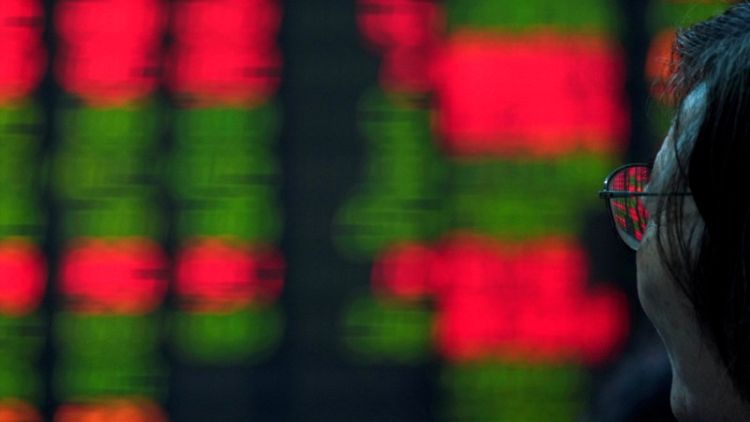By Andrew Galbraith
SHANGHAI (Reuters) - Stocks in Asia fell on Friday as global sentiment soured on issues ranging from trade worries, Italy's 2019 budget, higher U.S. interest rates and growth concerns in China that led to a slump in Chinese shares in the previous session.
Early in the trading day, MSCI's broadest index of Asia-Pacific shares outside Japan <.MIAPJ0000PUS> was 0.4 percent weaker following losses on Wall Street overnight.
The Dow Jones Industrial Average <.DJI> fell 1.27 percent, the S&P 500 <.SPX> lost 1.44 percent and the Nasdaq Composite <.IXIC> dropped 2.06 percent.
Australian shares <.AXJO> were down 0.6 percent, while Japan's Nikkei stock index <.N225> was 1.7 percent lower.
"Markets continue to digest the combination of higher U.S. rates, ongoing trade tension and Chinese growth concerns," analysts at ANZ said in a note.
On Thursday, the flight to safe-haven assets partly offset a rise in U.S. Treasury yields sparked by worries about the pace of interest rate increases by the U.S. Federal Reserve. Early in Asia on Friday, the 10-year yield <US10YT=RR> was higher at 3.1767 percent, compared with a U.S. close of 3.175 percent on Thursday.
The two-year yield <US2YT=RR>, sensitive to expectations of higher Fed fund rates, edged up to 2.8741 percent.
Investors are looking to third-quarter GDP data out of China, due Friday, for indications of a slowing economy. The numbers are expected to show the weakest pace of growth since the global financial crisis amid a worsening trade war with the United States.
China's premier said this week that the country's economic faces increased downward pressure, but said the government will take targeted measures to stabilise growth.
The benchmark Shanghai Composite index <.SSEC> touched its lowest level in nearly four years on Thursday before closing down 2.9 percent, dragged down by falling energy shares hit by cheaper oil and by widespread concern that plunging share prices could lead to a spike in margin calls.
Chinese authorities have taken steps in recent days to alleviate market pressure, including asking creditors of one Beijing company to avoid forcing margin calls.
In the latest trade war volley, the U.S. is requesting that a World Trade Organization dispute resolution panel look into tariffs imposed by China, the European Union, Canada and Mexico in retaliation to U.S. tariffs on steel and aluminium.
Further fraying market nerves, the European Commission on Thursday said a draft 2019 budget from Italy was in "particularly serious non-compliance" with EU rules, setting the stage for a possible unprecedented rejection of the country's fiscal plan.
The euro <EUR=> was flat at $1.1454, having lost 1.3 percent in a month, while the dollar index <.DXY>, which tracks the greenback against a basket of six major rivals, was a hair higher at 95.940.
The dollar was up 0.04 percent against the yen at 112.23 <JPY=>.
Oil prices ticked higher after falling on Thursday. U.S. crude <CLc1> was up 0.3 percent at $68.86 a barrel and Brent crude <LCOc1> was trading at $79.56 per barrel, also 0.3 percent higher.
Gold also rose, with spot gold <XAU=> trading at $1,225.56 per ounce. [GOL/]
(Reporting by Andrew Galbraith; editing by Richard Pullin)



